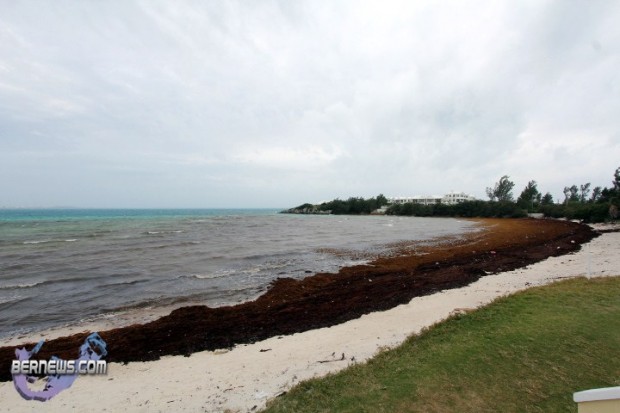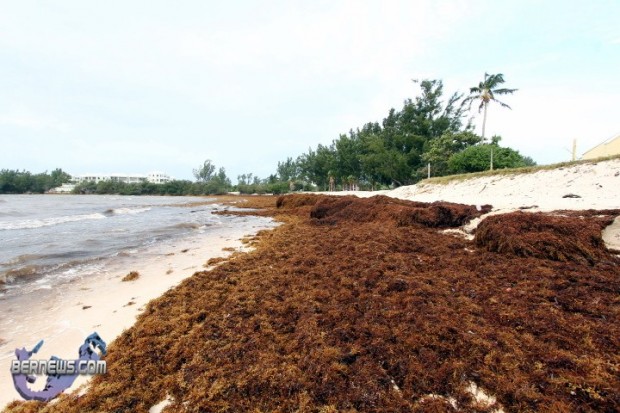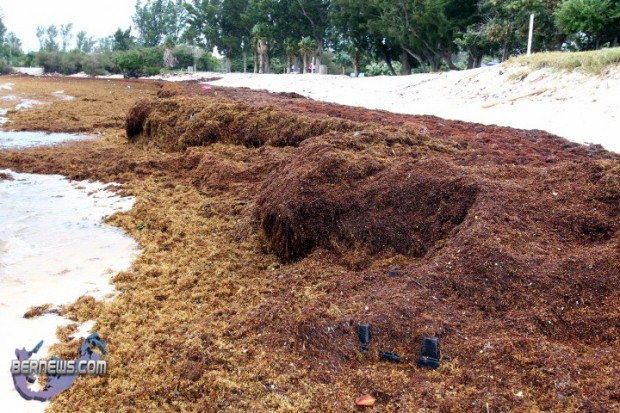Video: Seaweed On Beaches After Strong Winds
A spokesperson for the Environment Ministry said the Sargassum seaweed washing up on our shores is due to the sustained strong winds over a period of several days, and while it is not an indication of pollution, staff from the Parks Department are doing what they can to keep up with cleaning the most popular beaches.
“The seaweed washing up on the beaches is Sargassum, a unique floating seaweed which is common in our waters and the Sargasso Sea area of the Atlantic Ocean, as well as the Gulf of Mexico,” said an Environment Ministry spokesperson. “Sargassum seaweed provides a unique habitat in the deep waters of the open ocean.”
“The floating seaweed provides a structure that marine life can attach to, and is also a safe place for small marine organisms to hide from predators. Sargassum attracts a wide variety of species, and there are many endemic species that only occur in association with this seaweed.
“It is the basis of an incredibly diverse and productive ecosystem in the middle of the ocean. The biological and geochemical importance of this ecosystem for global biodiversity, fisheries and climate regulation are just some of the reasons that Bermuda is leading the Sargasso Sea Alliance in efforts to protect the Sargasso Sea.
“It is perfectly normal to have Sargassum collecting in Bermuda’s inshore waters and washing up on our beaches, and it does so regularly. As the seaweed generally drifts in open waters, it usually comes closer to shore in the winter months, when stronger winds and waves bring it towards the island and push it into the bays.
“Accumulations such as we are seeing at the moment can build up when we have sustained strong winds from the same direction over a period of several days, and can also occur when eddies from the Gulf Stream affect oceanographic currents near Bermuda. In no way is the presence of Sargassum on our beaches an indication of pollution, and the public should not be concerned in that regard.
“Although it is a natural phenomenon that contributed to the stabilisation of the Bermuda shoreline in the past, a side effect of Sargassum washing up on our beaches is that it will decompose there unless it is removed. Such decomposition will, naturally, produce an odour that some beachgoers might not like.
“Staff from the Parks Department are doing what they can to keep up with cleaning the most popular beaches, but the seaweed will continue washing up until the oceanographic conditions change.
“However, since humans have lived in Bermuda, many people have collected Sargassum off the beaches to use as fertilizer for gardens and farms. Indeed, before scientists realised the importance of the Sargasso Sea, ships from the United States used to go out and harvest Sargassum from the ocean in order to make fertilizer.
“Although this practice has now been curtailed, it confirms the value of the nutrients that Sargassum can add to the soil. Perhaps the ideal solution for dealing with the current situation would be for all the local gardeners and farmers to go down to the beach and collect a few buckets of Sargassum to add to their compost piles,” concluded the spokesperson.
Read More About
Category: All, Environment, News, Videos
Comments (10)
Trackback URL | Comments RSS Feed
Articles that link to this one:
- Sargasso Sea Conservation Declaration Signed | Bernews.com | March 11, 2014





I was wondering why I saw a guy with a bucket at the beach collecting this stuff. I was like….OK ;|
Dry it in the sun and then scatter it around your bananas – makes a great fertilizer for them.
Best to simply leave it on the beach at this time of year. It helps to hold the sand in place during the storms. Great fertilizer, especially for bananas. Do not put it right up against the tree.
Does anyone have any pics of it down the Bottom of Scuar Hill? so Amazing !!
oba and plp can put the seaweed in cans and sell to us as spinach, 5th pillar of the economy!
Silly…
Last year wasn’t this an environmental issue that someone or some group raised? Citing that our coral system was on the brink of death or something along those lines?
Removing the seaweed from the beaches is wrong. This is a natural phenomenom which actually builds beaches. The constant removal of seaweed from the beaches will, over time, cause the beach and the sand to slowly disappear. A good example of this is to find a picture of Tobacco Bay in St. George from 30 or 40 years ago and compare it to today. You will be amazed at how years of seaweed removal and the raking of the beach with a tractor has changed this beach and you will also see how much less sand is there now compared with before.
Historically,
Bermudas gardeners always collected seaweed that washed up on the beaches and it was used to provide nutrients, such as nitrogen. I’ve collected 3 huge bags and am letting the rain wash the salt off the seaweed before I spread it onto my gardens and particular plants. Back in the day, when people had horses and carriages, the dropped manure was collected and also served well in our gardens. Why waste it? The old timers learned by experience. Thank you!